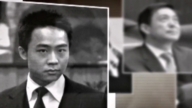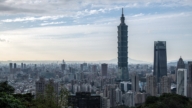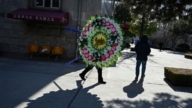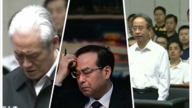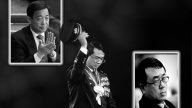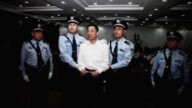【新唐人2013年08月22日訊】薄案開審 海內外密集關注
8月22號即將開審的中共前重慶市委書記薄熙來案,已經成為全球輿論關注的焦點。目前,大批中外媒體記者雲集濟南,各種消息紛至沓來,而濟南中院周圍的安保也已逐步升級,戒備森嚴。
據香港《大公網》報導,薄熙來於21號晚間被押解到濟南西站,然後被關押在看守所,22號將在濟南市中級法院接受審判。
十多家境外媒體記者也已陸續到達現場,《大公網》聲稱,濟南已成為薄案新聞戰場,在境外媒體申辦採訪證的吉華大廈入口,也已安裝安檢設備,記者須經領表、填表、受理、錄入、拍照、制證、領證等七道關卡,才能採訪。
公審高官也引起中國民眾的好奇心,有報導說,這些好奇都指向:公開審判高官的尺度有怎樣的玄機。還有一些訪民專程從外地趕赴濟南,想看看高官與平民受審有何不同。
不少大陸媒體21號還匯整了一些公審高官的「潛規則」,例如法庭面積暗示開放程度,事前預演細緻到休息和入廁時間,以及副部級以上官員受審不用穿囚衣等等。
臺媒:薄案開庭2天 無任何直播
據台灣《中央社》報導,中共官員星期三表示,薄熙來案庭期將達2天,全程將舉辦3到4場說明會,審理過程不會向任何對像提供影像及文字直播,但濟南中院官方微博會適時提供庭審過程的文字報導。
一天前,有中共背景的香港《鳳凰網》曾刊登獨家消息說,濟南中院將對薄熙來案庭審開啟庭審直播和微博直播。
但濟南中院人員針對查詢,反覆表示,沒有接到任何要進行影像及文字直播的安排,至於庭期及說明會的舉行方式,媒體記者應「注意簡訊通知」。
「無國界記者」籲允外媒旁聽薄案
薄案開審前夕,總部位於法國巴黎的「無國界記者」組織也發佈新聞稿,呼籲中共當局信守承諾,允許外國媒體和外國觀察者進入法院旁聽。
「無國界記者」表示,這次庭審雖然並沒有明確禁止旁聽,但是也沒有一家獨立媒體和國際媒體被許可進入法庭。
「無國界記者」說,在敏感案件期間,中共當局會依照慣例篩選記者,而在薄熙來案中,這種挑選十分高明,直到申請註冊進入法院旁聽的最後期限,才會通知說庭審已經滿員,而這個最後期限不到最後一刻也不會公開。
「無國界記者」呼籲說,中共當局應允許所有記者和觀察家旁聽薄熙來一案,否則,這次庭審就不能稱之為公開和透明。
編輯/周玉林
Global Media Focus On Bo Xilai Trial
Global media is currently focused on the trial
of Bo Xilai, Chongqing’s former Party chief.
The trial is scheduled to be held on August 22.
A large number of Chinese and foreign
media reporters have gathered in Jinan.
Various versions of rumors are circulating. Jinan
Intermediate People’s Court has reinforced security.
On its website, Hong Kong’s Ta Kung Pao reports
that Bo Xilai was taken to Jinan on August 21.
He is being held in a detention center. Bo is
on trial in Jinan Intermediate People’s Court.
Journalists of over a dozen foreign media arrived in Jinan.
Ta Kung Pao calls Jinan, a"Bo Xilai trial news battlefield".
Foreign journalists go through security checks, before
entering a local mansion to apply for interview permits.
Seven stages need to be completed to get the permit.
Media report that Chinese civilians also express
curiosity towards the trial of a senior Chinese official.
They are curious about the sentencing
guidelines to be used for a public trial.
Some petitioners even headed to Jinan to witness Bo’s trial.
They want to find out how it is different from an ordinary trial.
On August 21, China’s media reported on some of the
hidden rules used in the trial of senior Chinese officials.
For example, the court’s area suggests the
level of openness of the trial to the public.
The trial rehearsal even covers rest
intervals and bathroom breaks.
Officials above ministerial level are exempt
from donning prison uniform in court.
No Live Broadcast Offered at Bo Xilai Trial
On August 21, Taiwan’s Central News Agency
quoted a Chinese Communist Party(CCP) official.
He said that the trial of Bo Xilai will last two days.
During the trial, three to four briefings will be held,
whilst no broadcast via video or texts is offered.
The official micro-blog of Jinan Intermediate
People’s Court will publish news about the trial.
A day earlier, Hong Kong’s pro-CCP Phoenix
New Media had published exclusive news.
It says that Jinan Intermediate People’s Court will provide
live broadcast of the trial on TV and on the micro-blog.
However, the court staff has repeatedly replied
to queries, saying no live broadcast is arranged.
Media reporters should follow newsletters for
information about the trial date and the briefings.
Reporters Without Borders Appeals for Openness at Bo Xilai Trial
As the Bo Xilai trial approaches, Paris-based
NGO, Reporters Without Borders (RWB),
calls on the CCP regime to keep its promise.
That is, allowing foreign media and foreign
observers to be present in the court.
RWB says that CCP authorities have not expressively
banned foreign media from attending the trial.
However, no independent and international media
have yet been allowed to attend the court hearing.
RWB states that the CCP authorities will screen
foreign reporters, as they have done in the past.
The screening is very canny for the Bo Xilai trial.
At the deadline for applications to attend the hearing,
it will announce the number of hearing attendees is full.
Meanwhile, this deadline will not be
announced until the last moment.
RWB appeals to the CCP to open the
Bo Xilai trial to all journalists and observers.
Otherwise, the trial cannot be
considered open and transparent.



